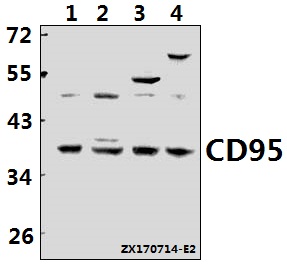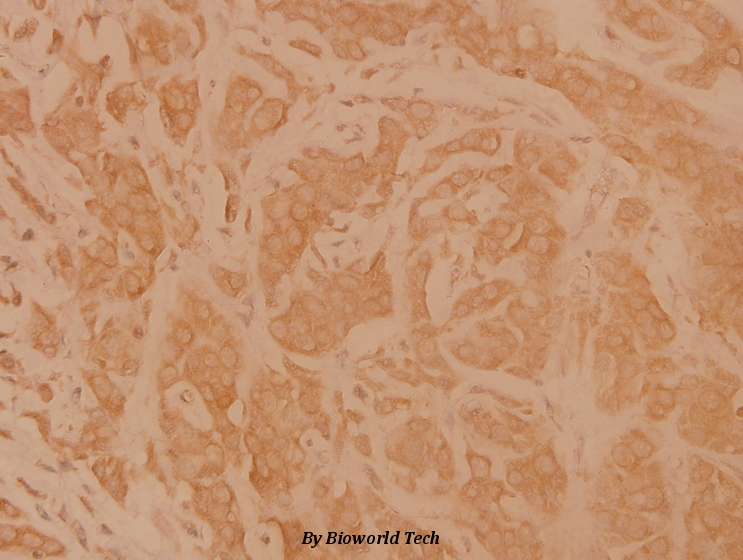Product Name :
CD95 (L315) polyclonal antibody Background :
Cytotoxic T lymphocyte (CTL)-mediated cytotoxicity constitutes an important component of specific effector mechanisms in immuno- surveillance against virus-infected or transformed cells. Two mechanisms appear to account for this activity, one of which is the perforin-based process. Independently, a FASbased mechanism involves the transducing molecule FAS (also designated APO-1) and its ligand (FAS-L). The human FAS protein is a cell surface glycoprotein that belongs to a family of receptors that includes CD40, nerve growth factor receptors and tumor necrosis factor receptors. The FAS antigen is expressed on a broad range of lymphoid cell lines, certain of which undergo apoptosis in response to treatment with antibody to FAS. Product :
Rabbit IgG, 1mg/ml in PBS with 0.02% sodium azide, 50% glycerol, pH7.2 Storage&Stability :
Store at 4°C short term. Aliquot and store at -20°C long term. Avoid freeze-thaw cycles. Specificity :
CD95 (L315) polyclonal antibody detects endogenous levels of CD95 protein. Immunogen :
Synthetic peptide, corresponding to amino acids 280-330 of Human CD95. Conjugate :
Unconjugated Modification :
Unmodification
CD95 (L315) polyclonal antibody Background :
Cytotoxic T lymphocyte (CTL)-mediated cytotoxicity constitutes an important component of specific effector mechanisms in immuno- surveillance against virus-infected or transformed cells. Two mechanisms appear to account for this activity, one of which is the perforin-based process. Independently, a FASbased mechanism involves the transducing molecule FAS (also designated APO-1) and its ligand (FAS-L). The human FAS protein is a cell surface glycoprotein that belongs to a family of receptors that includes CD40, nerve growth factor receptors and tumor necrosis factor receptors. The FAS antigen is expressed on a broad range of lymphoid cell lines, certain of which undergo apoptosis in response to treatment with antibody to FAS. Product :
Rabbit IgG, 1mg/ml in PBS with 0.02% sodium azide, 50% glycerol, pH7.2 Storage&Stability :
Store at 4°C short term. Aliquot and store at -20°C long term. Avoid freeze-thaw cycles. Specificity :
CD95 (L315) polyclonal antibody detects endogenous levels of CD95 protein. Immunogen :
Synthetic peptide, corresponding to amino acids 280-330 of Human CD95. Conjugate :
Unconjugated Modification :
Unmodification
-
 Western blot (WB) analysis of CD95 (L315) pAb at 1:500 dilution Lane1:Jurkat whole cell lysate(40ug) Lane2:K562 whole cell lysate(40ug) Lane3:H9C2 whole cell lysate(40ug) Lane4:SP2/0 whole cell lysate(40ug)
Western blot (WB) analysis of CD95 (L315) pAb at 1:500 dilution Lane1:Jurkat whole cell lysate(40ug) Lane2:K562 whole cell lysate(40ug) Lane3:H9C2 whole cell lysate(40ug) Lane4:SP2/0 whole cell lysate(40ug) -
 Immunohistochemistry (IHC) analyzes of CD95 (L315) pAb in paraffin-embedded human breast carcinoma tissue at 1:100.
Immunohistochemistry (IHC) analyzes of CD95 (L315) pAb in paraffin-embedded human breast carcinoma tissue at 1:100.
Neferine inhibits cultured hepatic stellate cell activation and facilitates apoptosis: A possible molecular mechanism
PMCID: Pubmed No.:20969858
In vitro Anti-Angiogenesis Effects and Active Constituents of the Saponin Fraction From Gleditsia sinensis
PMCID: Pubmed No.:22505594
The Combined Effects of Hematoporphyrin Monomethyl Ether-SDT and Doxorubicin on the Proliferation of QBC939 Cell Lines
PMCID: Pubmed No.:23200181
The local corticotropin-releasing hormone receptor 2 signalling pathway partly mediates hypoxia-induced increases in lipolysis via the cAMP–protein kinase A signalling pathway in white adipose tissue
PMCID: Pubmed No.:24859650
Fluoxetine suppresses AMP-activated protein kinase signaling pathway to promote hepatic lipid accumulation in primary mouse hepatocytes
PMCID: Pubmed No.:25102273
Isoflurane Damages the Developing Brain of Mice and Induces Subsequent Learning and Memory Deficits through FASL-FAS Signaling
PMCID: Pubmed No.:26609525
Excessive apoptosis and defective autophagy contribute to developmental testicular toxicity induced by fluoride
PMCID: Pubmed No.:26840522
Fluoxetine suppresses AMP-activated protein kinase signaling pathway to promote hepatic lipid accumulation in primary mouse hepatocytes
PMCID: Pubmed No.:25102273
Isoflurane Damages the Developing Brain of Mice and Induces Subsequent Learning and Memory Deficits through FASL-FAS Signaling
PMCID: Pubmed No.:26609525
Excessive apoptosis and defective autophagy contribute to developmental testicular toxicity induced by fluoride
PMCID: Pubmed No.:26840522
Isoflurane Damages the Developing Brain of Mice and Induces Subsequent Learning and Memory Deficits through FASL-FAS Signaling
PMCID: Pubmed No.:26609525
Saponin 6 derived from Anemone taipaiensis induces U87 human malignant glioblastoma cell apoptosis via regulation of Fas and Bcl‑2 family proteins
PMCID: Pubmed No.:27175997
Bioworld Biotech only provide peptides for our antibodies and do not provide additional peptide customization services.
Price/Size :
USD 368/1mg/vial
Tips:
For phospho antibody, we provide phospho peptide(0.5mg) and non-phospho peptide(0.5mg).Describe :
Blocking peptides are peptides that bind specifically to the target antibody and block antibody binding. These peptide usually contains the epitope recognized by the antibody. Antibodies bound to the blocking peptide no longer bind to the epitope on the target protein. This mechanism is useful when non-specific binding is an issue, for example, in Western blotting (WB) and Immunohistochemistry (IHC). By comparing the staining from the blocked antibody versus the antibody alone, one can see which staining is specific; Specific binding will be absent from the western blot or IHC performed with the neutralized antibody.Formula:
Synthetic peptide was lyophilized with 100% acetonitrile and is supplied as a powder. Reconstitute with 0.1 ml DI water for a final concentration of 10 mg/ml.The purity is >90%,tested by HPLC and MS.
Storage:
The freeze-dried powder is more stable. For short time at 2-8°C. For long term storage store at -20°C.
Note :
This product is for research use only (RUO only). Not for use in diagnostic or therapeutic procedures.
 CD95 (L315) polyclonal antibody
CD95 (L315) polyclonal antibody  Datasheet
Datasheet COA
COA MSDS
MSDS SHIP
SHIP